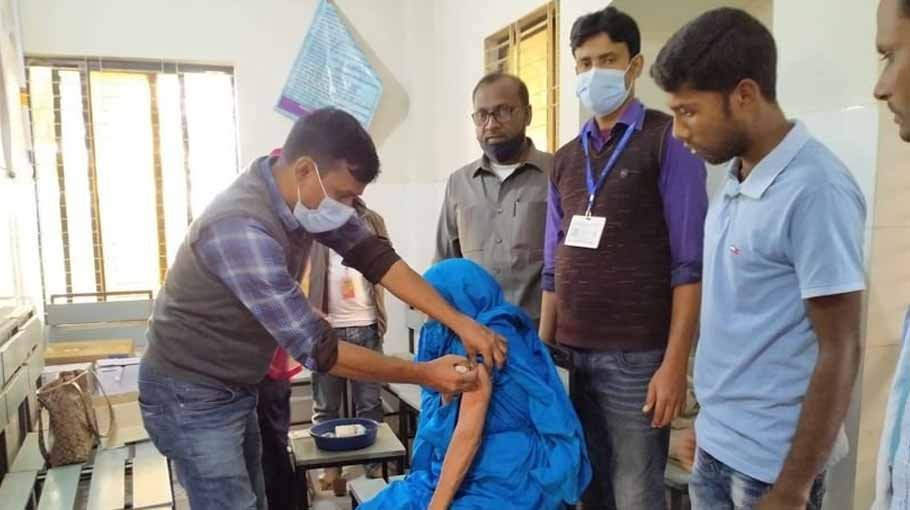Community clinics facilitate Covid jabbing of rural people

Bangladesh has been able to vaccinate its 70 percent of population with COVID jabs due to huge network of community clinics, those played the key role in reaching out rural people even at the country’s most inaccessible and remote areas.
Nearly 14000 community clinics, the lowest tier of the primary healthcare mechanism that lies up to the country’s periphery facilitated inoculating around three crore rural people.
The Community Health Care Providers (CHCPs) of the clinics have been responsible for collecting, distributing and administering the COVID jabs at their respective centers.
Experts said whereas other countries have failed to reach out its marginal population to immunize against Covid-19 pandemic , Bangladesh made the success due to only existence of community clinics that has already been identified as a model of primary healthcare system to many developing countries.
According to the Directorate of Health Services , 2,88,11,600 rural people have been vaccinated at grass root level through community clinics while CHCPs were also deployed to vaccinate 1,79,19,945 students of school, college and universities at many parts of the country. Of them, 1,43,29,989 students have been vaccinated with the first dose while 35,69,097 received the second dose.
Besides, 2944 Madrasa students and 18266 floating people also got vaccinated under the management of community clinics.
“The government involved the community clinics in its vaccine campaign so that even marginal people can get the jabs at their door steps,” said Community Base Health Care (CBHC) line director Masood Reza Kabir.
Bangladesh government started COVID-19 vaccine campaign in February 2021 ahead of many countries of the world. Since then, two doses of vaccine have been given to more than 11.81 crore people while 12.8 crore received the first dose of different kinds of vaccine like Oxford-AstraZeneca, Pfizer, Johnson & Johnson, Moderna and China-made Sinopharm form.
Apart from the two doses of vaccines, so far, nearly 1.5 crore people also received the booster dose.
Kabir said that the government had only been able to reach out such huge number of countrymen to vaccinate as the community clinics brought the jabs up to village level at the doorsteps of rural people.
“It would have not been possible for me to go to upazila health complex which is 10 kilometers away to take jab,” said Debabrata Sarkar, who got vaccinated at Kusambi Community Clinic in Tarash thana in Sirajganj district.
Sarkar thanked the government to make vaccine available at their doorsteps as the villagers believe there is a risk to get exposed to the deadly virus at the crowded place like upazila health complexes.
“People come from many places at the upazia health complex, you never know who is carrying the virus . so, we are glad that we got the vaccine at our village without any hassle,” Sarkar said.
Besides, he said, they heard that many people did not able to get shot at the upazila health complex even after standing at a queue for hours.
“Like, you were waiting for 3-4 hours in the queue … but you may hear that the vaccine was run out for the day when your turn comes,” he said questioning that who would take this hassle keeping their household work undone specially the women.
Amrit Pramanik, a CHCP of Kusambi Community Clinic highly lauded the government's vaccine management at the community clinic as it works in a very systematic way without creating any hassle to the rural people.
People who did not want to go to the upazila to get vaccinated before, came to the community clinic to get vaccinated, he said.
Community Clinic is the flagship program of Awami League government, an innovation of Prime Minister Sheikh Hasina to extend primary health care to the doorsteps of the people all over rural Bangladesh.
Nearly 14000 community clinics, remain open six days in a week and giving treatment to on average 50 to 60 patients daily, are on board and the number is gradually increasing.
Prime Minister Sheikh Hasina initiated the program on April 26, 2000 by inaugurating Ghimadanga Community Clinic in Patganti Union under Tungipara police station in Gopalganj district.
In the last 22 years, community clinics have become an integral part of the healthcare of the rural population in Bangladesh through free distribution of 30 types of medicines as well as advice on primary health care, family planning and nutrition.
According to the government statistics, so far 62.57 crore people have taken services from such community clinics.
Health and family welfare minister Zahid Malique said community clinic is one of the Bangladesh successes those are identified as model for other developing countries.
“We have planned to build more modern community clinics to spread the proper primary healthcare to every corner of the country,” he said.



